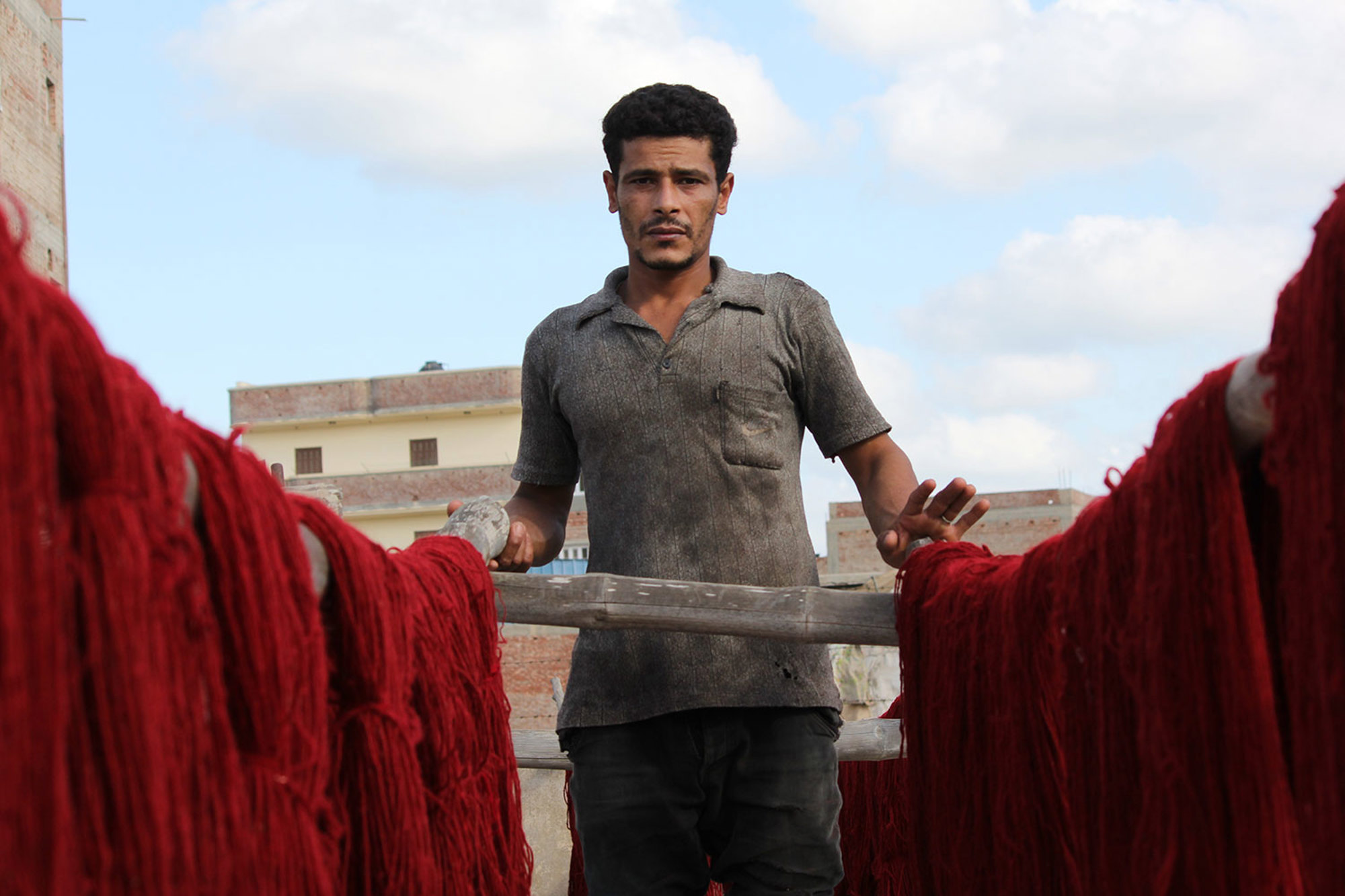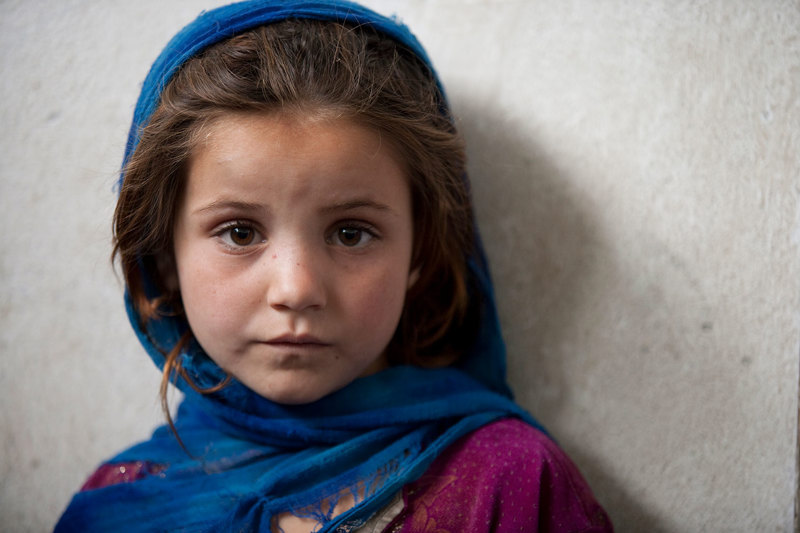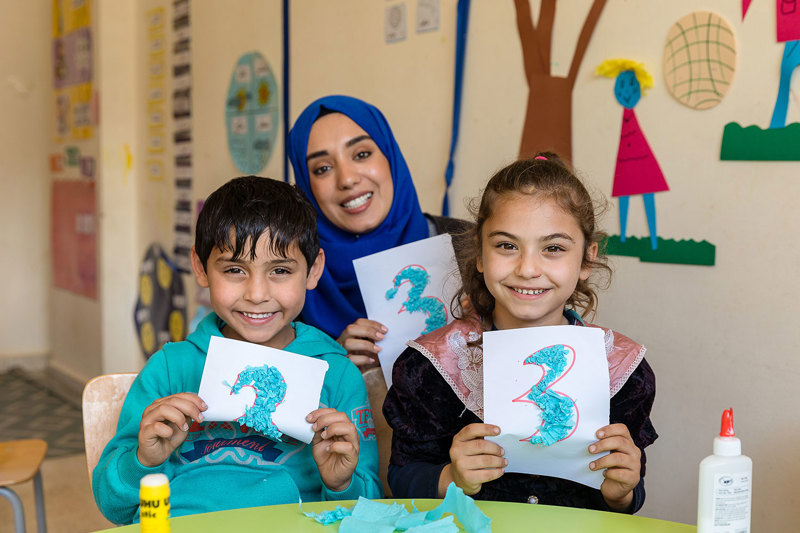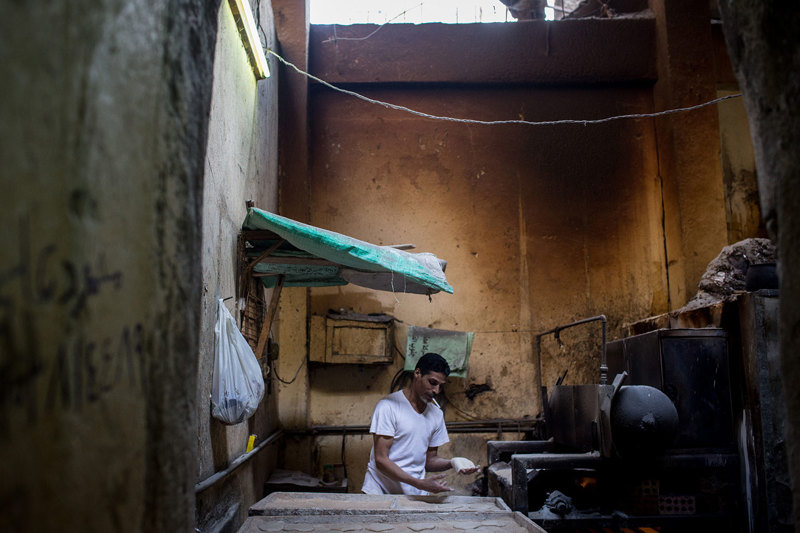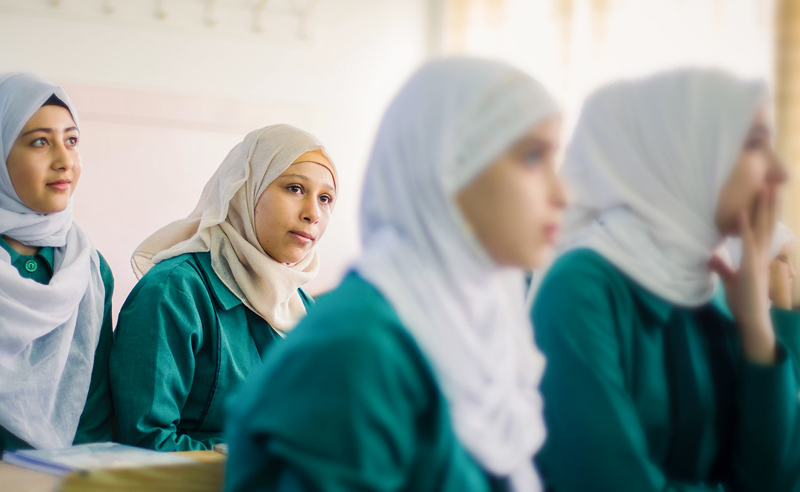The opportunity for impact
In 2003, Mohammed Abdul Latif Jameel’s philanthropic journey was at a crossroads. Jameel had donated to worthy causes for years. He had just formalized his philanthropy by establishing Community Jameel, a group of initiatives focused on supporting positive social and economic development in the Middle East and beyond. He was eager to do more.
However, Jameel realized that governments and donors were contriuting vast sums of money to programs that addressed critical needs in the fields of health, education, and livelihoods, even though there was a near-total absence of data to show which programs were effective. As his son, Fady Jameel, president, international, of Community Jameel, notes, "Sometimes, interventions conceived with the best of intentions can have minimal — or even negative — impact on the people they are trying to help."
The situation was particularly troubling given the scale of the need. For example, in 2003, fewer than 30 percent of secondary students in the Arab region met international thresholds for math proficiency. This generation also faced a challenging future, as the region had the world’s highest youth unemployment rate. That and other dispiriting realities redoubled Jameel’s desire to find a better way to identify, support, and scale effective programs. There had to be a more precise approach than simple dashboards of "key performance indicators" that may or may not determine impact.
At about the same time, 4,000 miles away, economics professors Abhijit Banerjee, Esther Duflo, and Sendhil Mullainathan at the Massachusetts Institute of Technology (MIT) — where Mohammed Jameel earned his bachelor’s degree — were confronting the same conundrum: How do we determine whether an antipoverty program actually works?
In an attempt to answer that question, the MIT economists established the Poverty Action Lab (PAL), a global research center focused on poverty and development. PAL differed from its peers in that it used randomized evaluations to test the efficacy of antipoverty programs. The idea: an organization introduces a new program randomly among some people but not others, and PAL’s researchers measure and compare how much improvement occurred in each group. Because both groups are identical in every other way, any differences in outcomes can be attributed to the program.
This approach can test many antipoverty programs — from education to health to employment — and provide evidence that positions PAL to help governments, donors, and NGOs advance only those programs that deliver the most value and impact.
Despite its tiny budget, PAL had large ambitions. "We're interested in changing millions of people’s lives," explains Rachel Glennerster, the organization’s former executive director, “not just in making a few villages wonderful."
For PAL to realize that vision, it needed someone to bet big on its growth. By 2005, PAL had conducted 48 randomized evaluations. Further scaling its research and expanding its influence would require building more infrastructure. Susan Hockfield, MIT’s president at the time, knew of Jameel’s interest in using evidence to fight poverty. That same year, she introduced him to Banerjee and Duflo.
Fady Jameel recalls that when he and his father learned about PAL, they "saw that it was aligned with Community Jameel, with the potential to impact millions of people worldwide."
That meeting was the start of what would become a groundbreaking partnership to galvanize the fight against poverty globally.

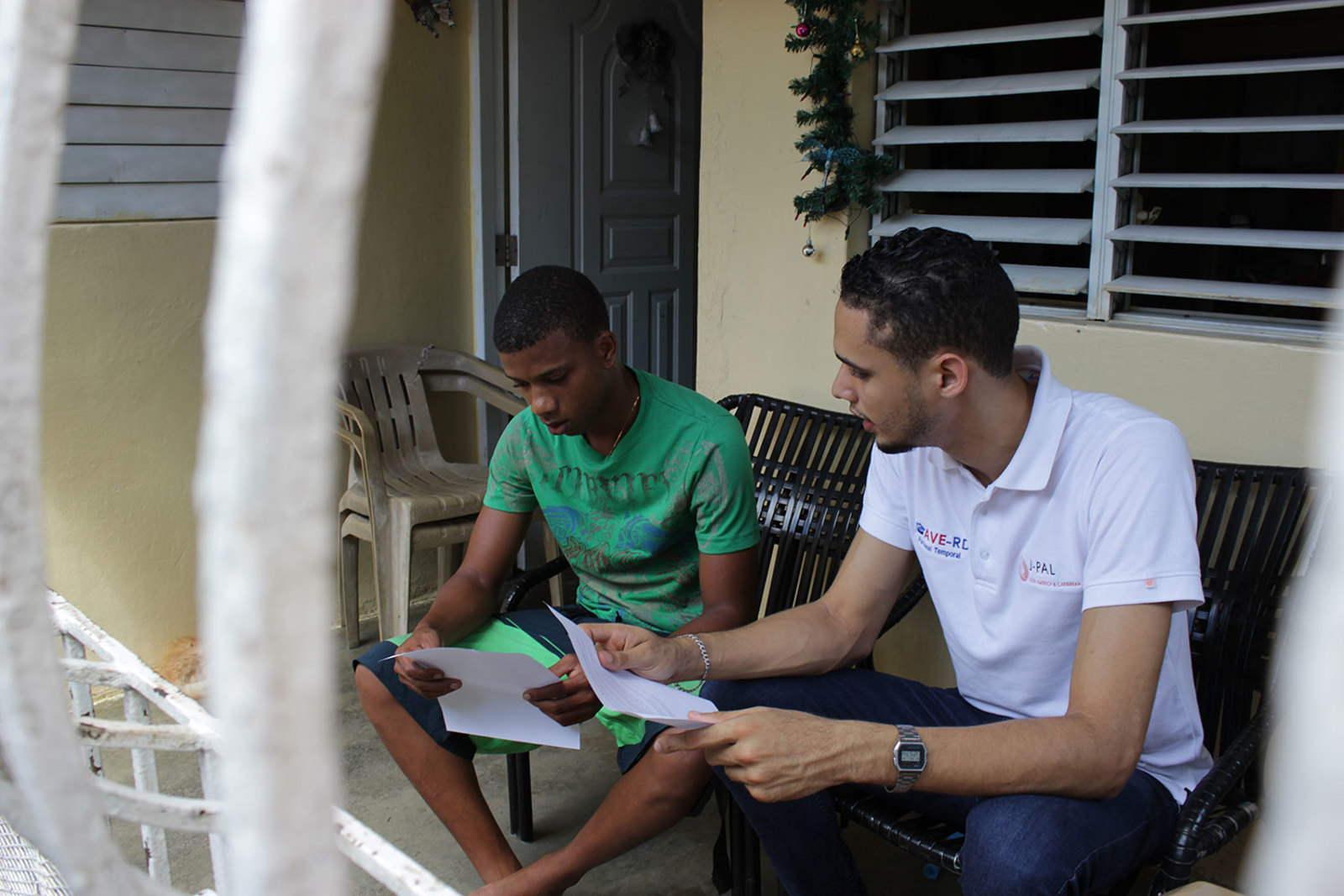
A bold investment in scaling evidence-based programs
In 2005, Community Jameel made a significant investment in PAL, and the organization was renamed the Abdul Latif Jameel Poverty Action Lab (J-PAL), in honor of Mohammed Jameel's late father. This large initial gift, and Community Jameel’s subsequent investments of money and time in J-PAL, was bold in multiple ways.
First, through J-PAL, Community Jameel made an enduring commitment to alleviating poverty. While the Jameel family had invested heavily in Saudi Arabia and the countries around it, both in business leadership and philanthropy, Community Jameel's support for J-PAL was grounded in the family's aspirations to advance health, education, and livelihoods around the world. Community Jameel made a long-term, sustaining investment — structured as endowments — to establish J-PAL.
Community Jameel’s 2005 gift endowed a professorship, two fellowships, and a research and teaching fund, all in the areas of poverty alleviation and development economics. While endowment gifts are common in academia, they are rare in initiatives focused on social change, like J-PAL, and especially in those that are essentially start-ups. This gift represented a leap of faith. For more than 13 years, Community Jameel has continued to provide flexible support that is integral to J-PAL’s efforts.
"A huge part of J-PAL’s success has been that we have a guaranteed source of income from year to year," notes Iqbal Dhaliwal, executive director, J-PAL Global. "This has allowed us to think long term, focus on the work rather than on fundraising, and attract talent who would normally look at government or other jobs."
Second, with J-PAL, Community Jameel chose to deliver on that ambition with an indirect impact approach, a departure from the more typical path of investing in specific projects that directly address people’s needs and deliver more readily quantifiable results: houses built, jobs created, children fed. Jameel instead backed a start-up that was committed to generating evidence that helps direct service providers, like NGOs and governments, deliver more effective programs.
Finally, Community Jameel was at the forefront of the evidence movement in the social sector. The family believed that rigorous statistical analyses, such as randomized evaluations, could help identify and direct resources towards promising ways to tackle poverty.
Randomized evaluations had long been used in other fields such as medicine to assess the efficacy of new treatments. As one of the first actors to bring this approach to the social sector, J-PAL was poised to play a pivotal role in advancing the "what works" movement, helping NGOs, governments, and donors around the world direct their efforts and resources toward the most effective antipoverty programs.
Just as important, J-PAL would also work to build demand for data, by shifting the focus of governments, NGOs, and donors from "good intentions" to evidence-informed decision making.
J-PAL has transformed itself from a start-up with a novel approach to an organization that has benefitted more than 400 million people around the globe, through programs and policies that J-PAL affiliates evaluated and found to be effective.
In the Arab region, in collaboration with Community Jameel, J-PAL has launched its newest regional office, J-PAL Middle East and North Africa (MENA), based at the American University of Cairo. J-PAL MENA will partner with local philanthropists to evaluate compelling global education, employment, and anti-poverty interventions.
J-PAL’s model in action: partnering with the Sawiris Foundation for Social Development in Egypt
The Sawiris Foundation for Social Development (SFSD) invests in programs across Egypt that create sustainable job opportunities, provide education, and enable access to microcredit. Since 2001, these programs have reached more than 170,000 people. However, the foundation did not know the extent to which these programs supported long-term change. Seeking to understand the programs’ true impact on constituents’ lives, SFSD teamed up with J-PAL.
-
Conducting and sharing research
In 2015, SFSD launched a partnership with J-PAL to conduct randomized evaluations of some of its locally-developed programs. The foundation ran a "Job Creation Competition" to identify the most promising NGO projects for creating jobs in Upper Egypt, where poverty rates are the highest in the country.
J-PAL conducted a three-year evaluation of the select projects to test their efficacy. One of the questions they worked to answer was whether loans and grants would be more effective in helping young entrepreneurs start and maintain a business. They found that both types of support led to an increase in business creation and profits 12 months after disbursement, with especially large increases for women.
Yet, while total income for women increased, the same was not true for men. This is because women without the support stayed unemployed, while men without support managed to find other ways to earn money.
These findings will inform how SFSD can best design more effective job creation programs and maximize the impact of its funding.
-
Influencing policy
J-PAL and SFSD are also working to adapt globally successful models. From its inventory of proven interventions, J-PAL recommends those that are most likely to match local needs and the foundation’s goals.
One example is BRAC’s Graduation Approach, an intervention to help ultra-low income households climb out of extreme poverty. Compelled by J-PAL’s evidence, SFSD decided to work with J-PAL, BRAC, and local government to adapt the Graduation Approach, implement it in Egypt, and evaluate its impact.
-
Educating and training
In order to help extend the impact of these research and policy efforts, J-PAL is helping SFSD set up a monitoring and evaluation team. "Working with J-PAL has helped us move beyond monitoring processes to measuring outcomes and impact in order to assess which programs are truly successful and, more importantly, which programs sustain beyond the grant period," says Noura Selim, executive director of SFSD. "It has deeply influenced the way we invest."
Additionally, the foundation has collaborated with J-PAL to hold a series of impact evaluation workshops with the project winners from its Job Creation Competition.
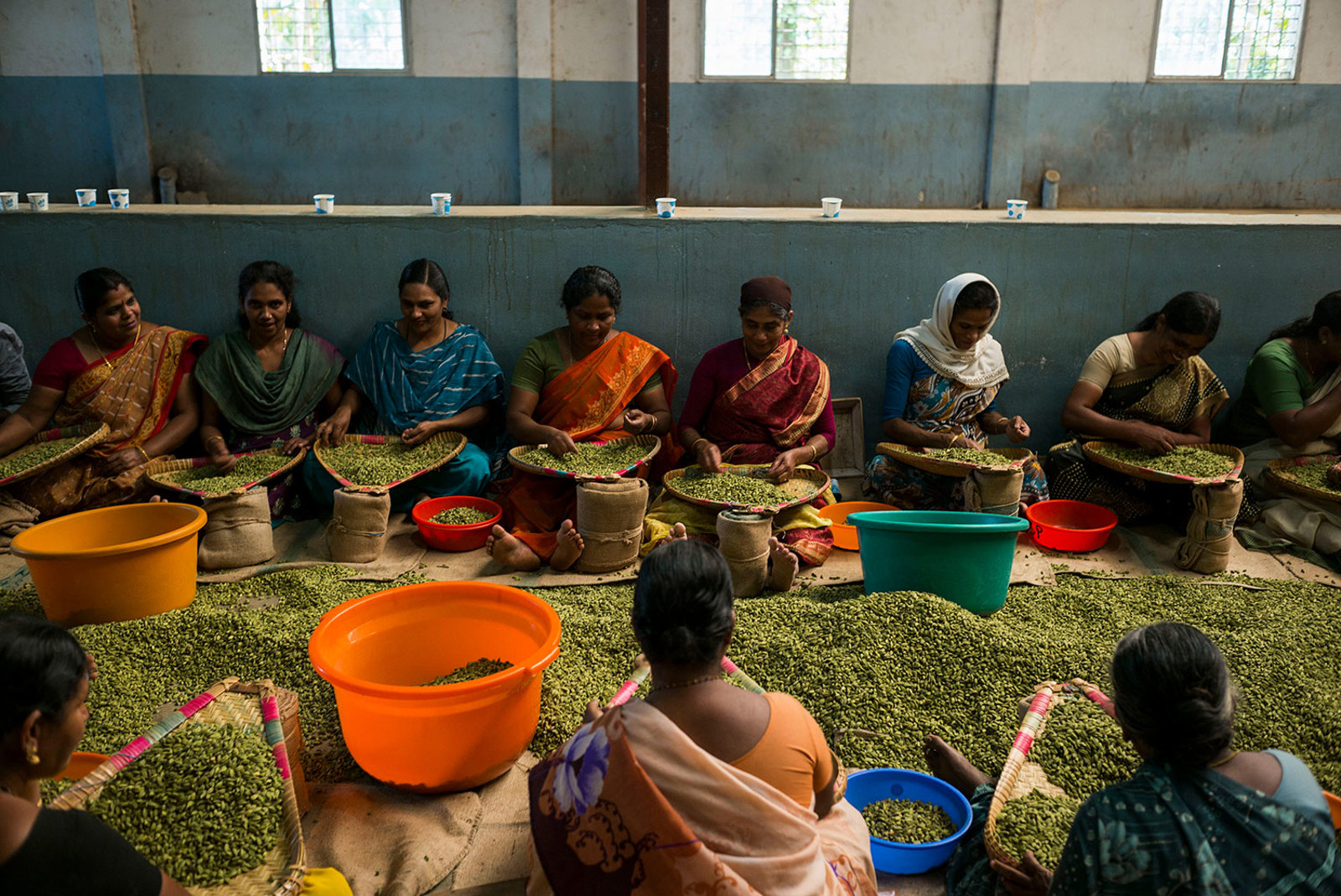
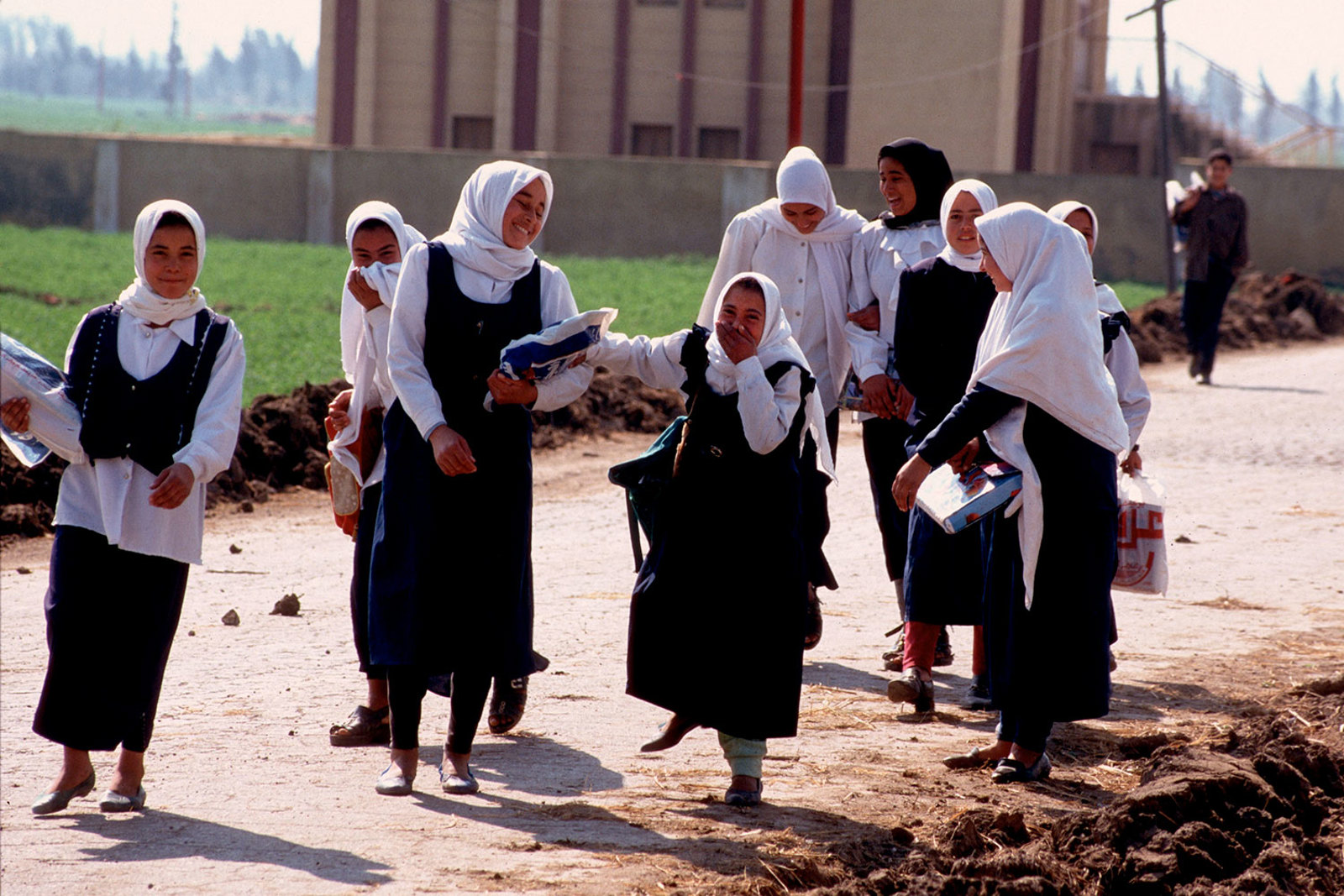
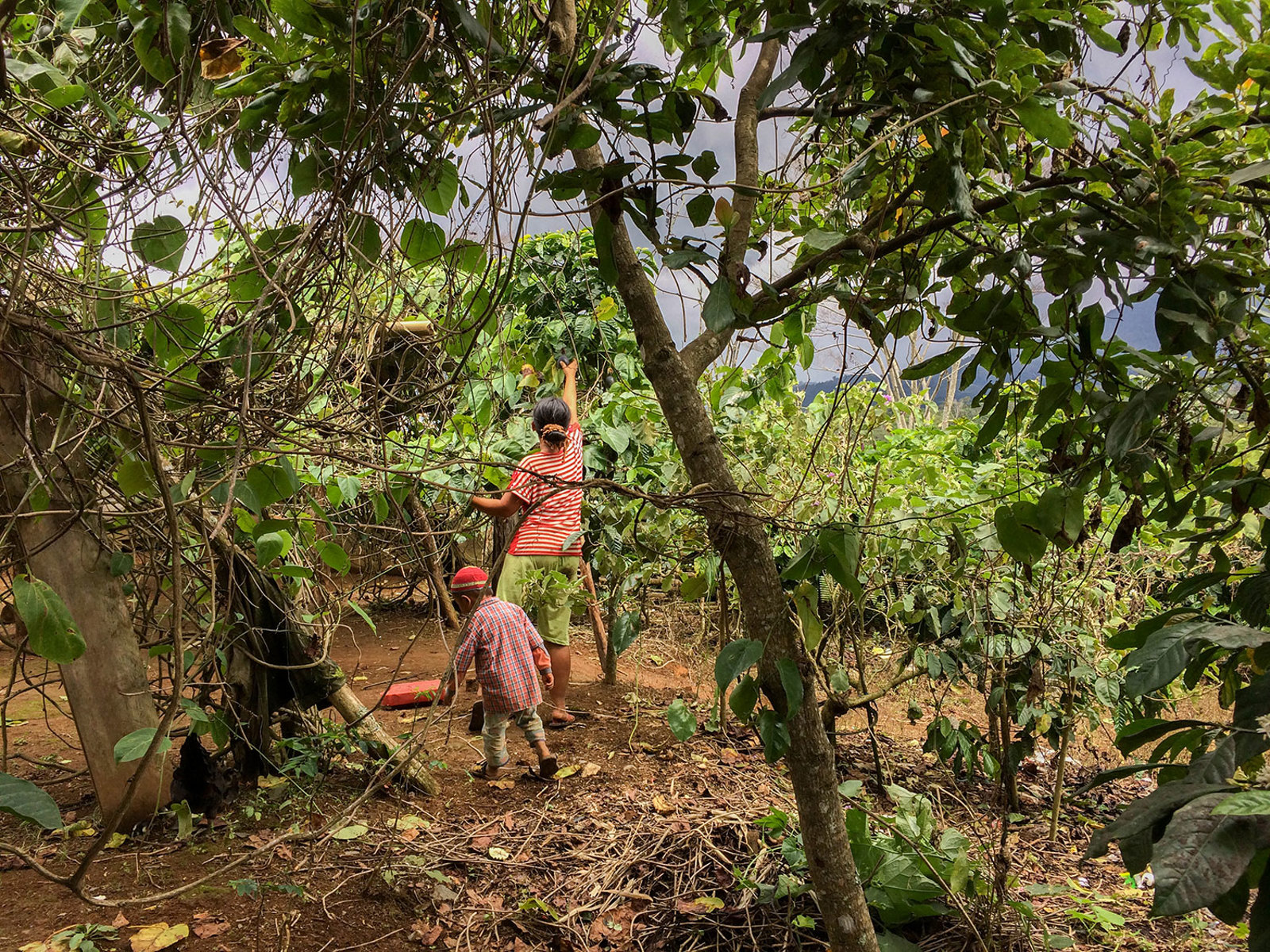
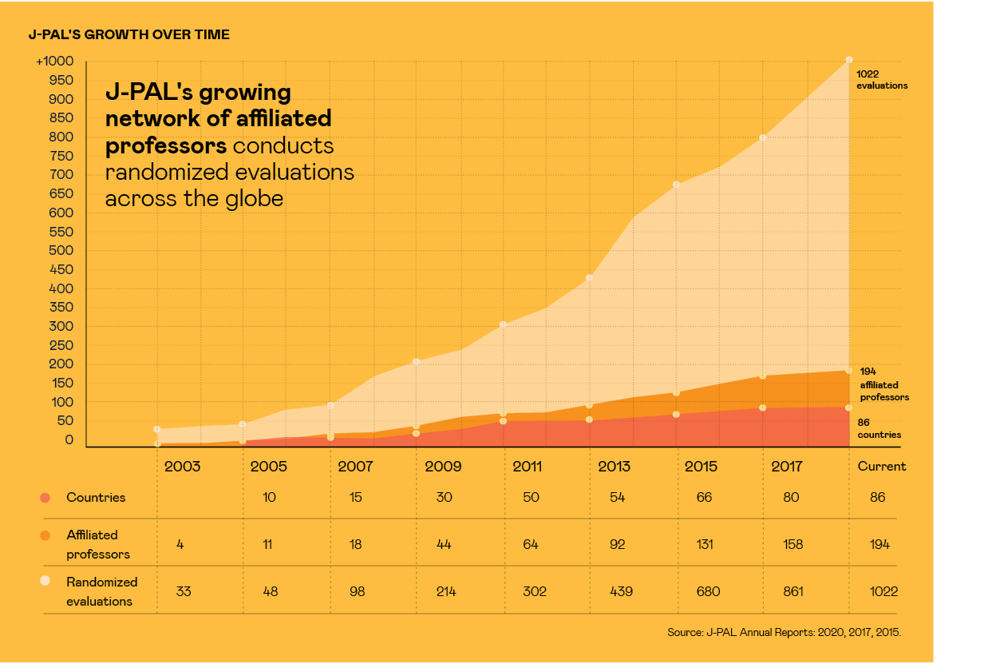
How the initiative works
J-PAL works with a global network of more than 190 affiliated professors from the world’s top universities to design and conduct randomized evaluations of poverty-alleviation programs. Leading universities around the world host J-PAL’s seven regional offices. The American University in Cairo (AUC) hosts J-PAL MENA, J-PAL's newest regional office, launched in 2020.
Today, J-PAL carries out three main activities:
1. Conducts and shares research
Through rigorous randomized evaluations, J-PAL expands the social sector’s understanding of which poverty-alleviation programs work and which do not. Its affiliates have led more than 1,000 randomized evaluations across a diverse range of topics, from clean water to microfinance to crime prevention. The research group at J-PAL, funded in part by Jameel’s investment, helps support affiliates in conducting evaluations.
It is not unusual for these studies to contradict unproven, common-sense approaches. Consider the body of research on the effect of class size on academic outcomes. Because schools in low and middle-income regions tend to be overcrowded, many programs aim to improve learning by reducing class sizes. As a result, they often invest significant money in hiring additional teachers to improve student-teacher ratios.
However, studies have repeatedly shown that simply adding resources is not enough to meaningfully improve students’ performance. Class-size reductions and other one-off changes must be integrated with broader improvements in pedagogy or school governance to truly amplify student learning.
Therefore, in this case, a metric for J-PAL's success would be funders redirecting their investments to proven initiatives, such as Teaching at the Right Level (TaRL). Having evaluated this pedagogical approach in India and several other countries, J-PAL found that TaRL boosts learning outcomes by grouping students according to their learning level (rather than age or grade) and tailoring teaching to that level.
2. Influences policy
J-PAL researchers’ studies are only helpful if they inform the decisions of governments and donors about which approaches they should fund. Take J-PAL's TaRL work: various Indian state governments, seeing the model’s success in India, have incorporated it into their own work. Co-Impact, a donor collaborative focused on large-scale social impact, recently announced a grant to scale TaRL’s approach across several countries in Africa.
To spread its research and insights, J-PAL policy staff work with the network of professors to distill findings into lessons that are relevant to policymakers. It also builds partnerships with governments, NGOs, and other decision makers to share frameworks for applying global evidence to local contexts, and to support the use of evidence to drive policy reform. These supports include providing funding and technical assistance, as well as embedding staff to help shape projects and policies that deliver results.
3. Educates and trains
J-PAL educates and trains policymakers and program staff on how to conduct high-quality evaluations and then use evidence to make smarter decisions. It has a range of training resources and in-person executive education options, including online courses and customized workshops. J-PAL offers free, online courses on evaluating social programs and measuring health outcomes. It also offers in-person workshops for researchers, field managers, or anyone else, which can be customized by sector or interest.
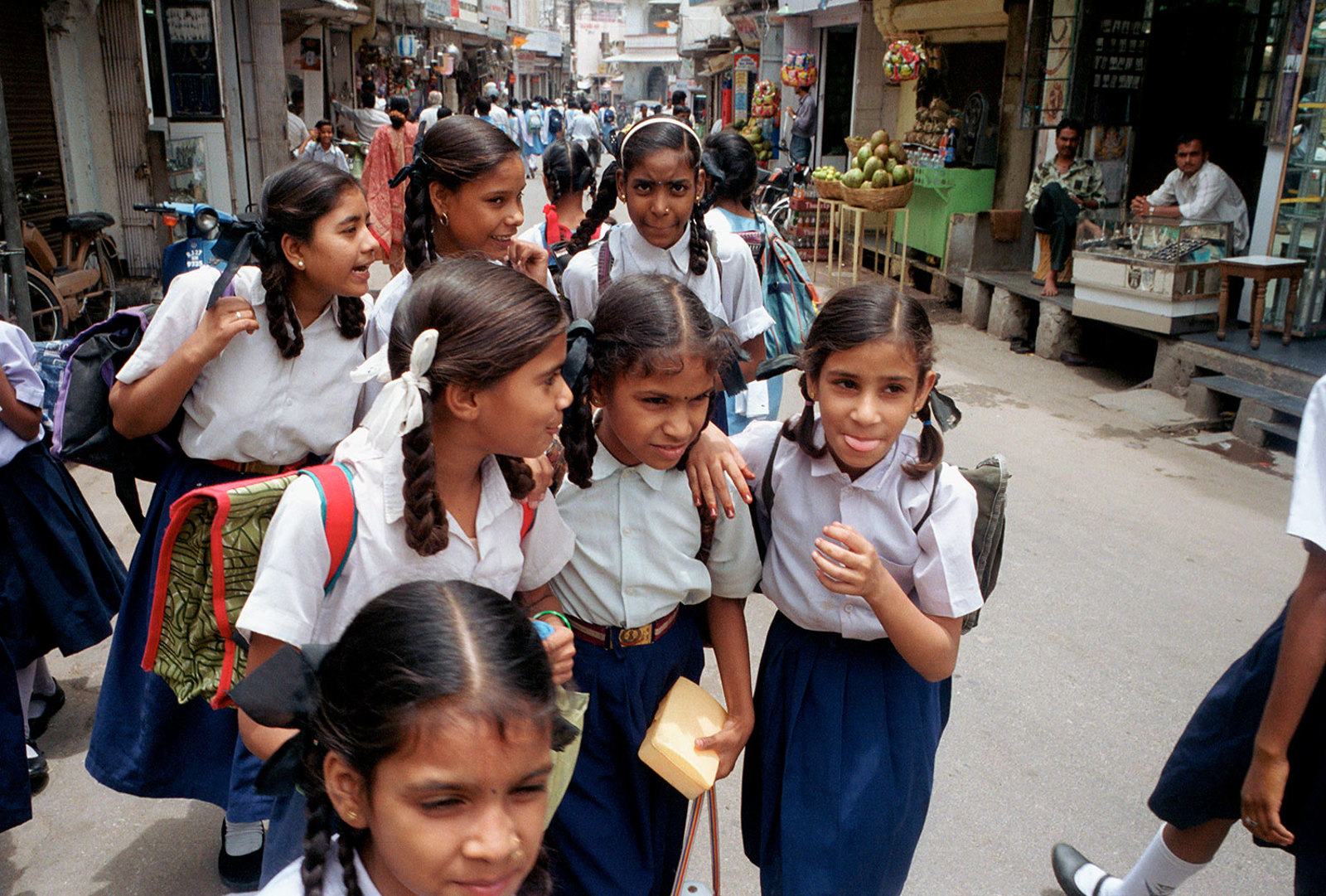
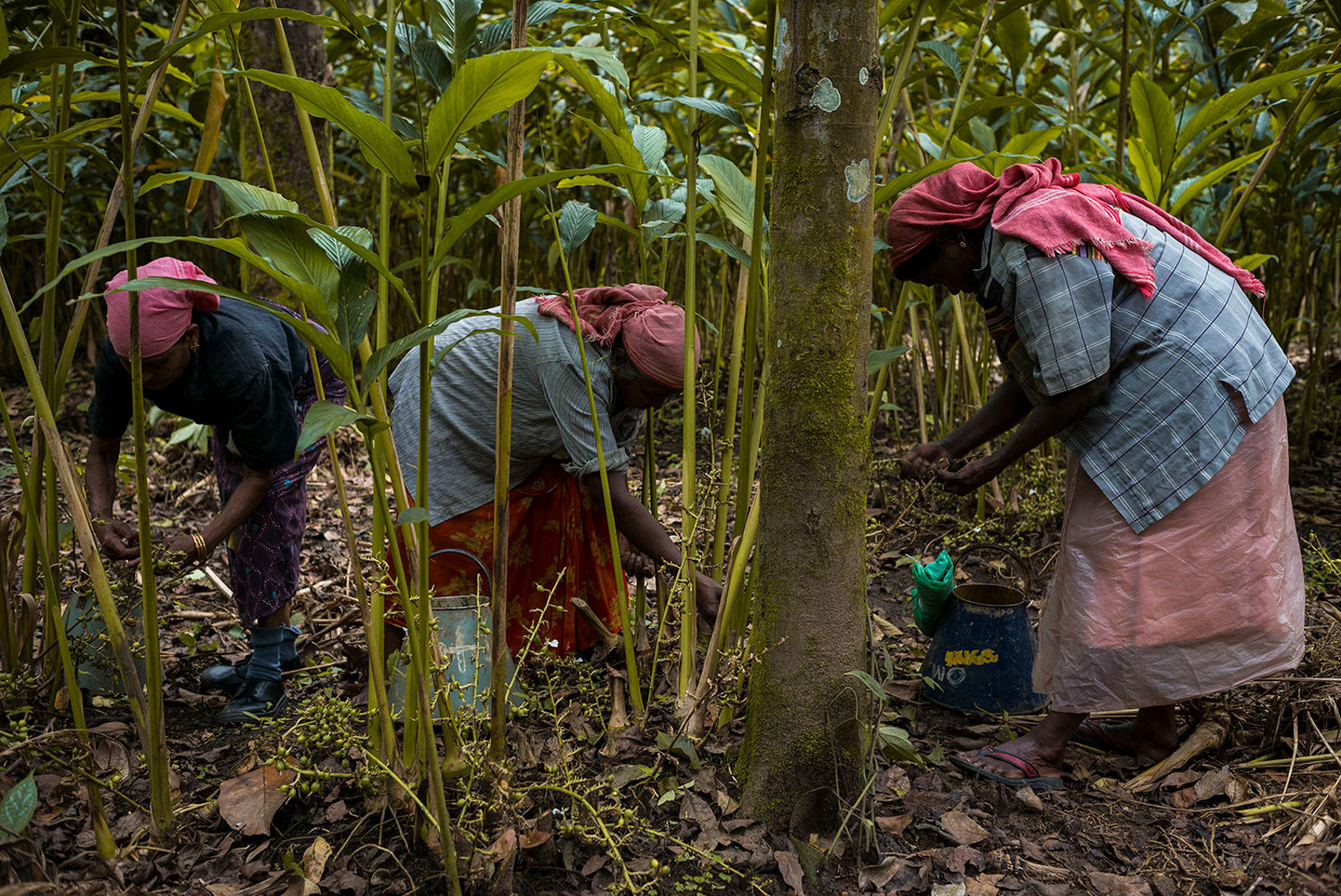
Progress and results
To date, programs evaluated and found to be effective by J-PAL have received investments that allowed them to scale and reach more than 400 million people worldwide. J-PAL has partnerships with over 25 governments in 15 countries to promote the use of evidence in decision-making.
Additionally, since Jameel made his initial gift to J-PAL, many other key funders have followed, including the Bill & Melinda Gates Foundation, the William and Flora Hewlett Foundation, the Laura and John Arnold Foundation, the John D. and Catherine T. MacArthur Foundation, and the UK Department for International Development.
To understand how J-PAL’s approach can overturn conventional wisdom, consider what it has revealed about microcredit, which NGOs and governments around the world embraced as a way to alleviate poverty. As of 2013, microcredit-based initiatives had reached over 200 million people, half of whom were living in extreme poverty. Yet despite this broad reach, detractors argued that microcredit trapped poor households in debt.
In the midst of this debate, J-PAL affiliates conducted a series of randomized evaluations to test microcredit’s impact. They found that microcredit’s impact is limited. On average, it does not lead to higher incomes or pathways out of poverty. At the same time, it does not leave borrowers worse off.
Further research by J-PAL affiliates, in partnership with leading NGOs, has helped reveal promising, more holistic approaches to tackling the challenges facing poor households. For example, J-PAL-affiliated researchers worked with BRAC, a Bangladesh-based NGO, to evaluate one of its initiatives, the Graduation Approach. Pioneered by BRAC’s Targeting the Ultra Poor (TUP) program, the Graduation Approach provides ultra-poor households with a productive asset (such as a goat, cow, or supplies for trade), training on how to manage the asset, and additional supports such as healthcare, life-skills training, and ongoing coaching. The goal: to help marginalized people earn their way out of extreme poverty.
After partnering with BRAC to test the program in Bangladesh, researchers working with implementing organizations in seven countries evaluated replications of the program. They found that the model enabled the poorest women to diversify their income sources and begin running small businesses, increasing their earnings by an average of 38 percent over four years. There were also improvements in food security, asset holdings, and savings. These studies provided hard evidence that the Graduation Approach helped alleviate poverty.
It is hard to overstate the impact of these findings. Before the Graduation Approach emerged, there had not been "much rigorous evidence that outside aid can sustainably lift people out of poverty," as Nicholas Kristof wrote in The New York Times in 2015.
Given TUP’s success, BRAC has expanded the Graduation Approach to over 580,000 women in Bangladesh, more than double the number they originally planned to reach before the evaluation by J-PAL affiliates.
Beyond conducting the research, J-PAL summarized the evidence and shared it with policymakers around the world. Through the work of J-PAL and others, the Graduation Approach now supports a pathway out of poverty for millions of ultra-poor families across 20 countries.
EXPANDING IN THE ARAB REGION
After launching six successful regional offices around the world, in 2015, J-PAL began deepening its efforts in the Arab region, working with AUC. Two years later, J-PAL co-founder and co-director Abhijit Banerjee announced that the organization would further expand its work in the region. AUC and J-PAL formalized their partnership shortly thereafter, and in 2020, J-PAL MENA at AUC launched in collaboration with Community Jameel, becoming J-PAL's seventh regional office.
J-PAL’s affiliated researchers in the region have now undertaken 29 randomized evaluations on labor, health, education, and other social programs.
"Expanding our research, policy, and training activity in [the region] is a key strategic goal for J-PAL," says Alison Fahey, interim executive director of J-PAL MENA. “As we build the foundation of the new office, we are working hard to identify philanthropic partners who want to join us to launch a research initiative that will seed impact evaluations on the effectiveness of social policy in the MENA region.”
When J-PAL began doing more work in the region, it was largely unknown, and there was little familiarity with the concepts of randomized evaluations or evidence-based policy. To build demand for its approach, J-PAL focused on sharing evidence from its previous work that was relevant to actors in the region, as well as on building local relationships and initiating public outreach.
"There’s been growing interest in the region to understand how you can design and scale social programs that work and the kind of impact that can have," notes Fahey. "We are thrilled to build on this momentum now as we launch J-PAL MENA."
Community Jameel has been an important partner in J-PAL’s early work in the Arab region, both by providing seed funding and by helping it build relationships. Community Jameel worked with J-PAL to organize a half-day convening in Dubai to seek advice on how it could help tackle social policy priorities in the region, raise its own profile, and build partnerships.
As Fady Jameel puts it, "In the Arab region, where Community Jameel’s footprint is greatest, we work to advocate J-PAL’s findings, to promote J-PAL’s approach among key regional players, and to identify new opportunities for J-PAL to work with agencies and regional NGOs to evaluate the impact of interventions."
With this support, J-PAL’s efforts to build demand seem to be paying off, as it is seeing an uptick in requests to evaluate locally developed interventions from NGOs and government partners. One example is a set of new partnerships to evaluate programs targeted at Syrian refugees and host communities in the region. This is potentially groundbreaking, as the field has seen few randomized evaluations.
Aside from evaluating impact, J-PAL has also brought proven programs to the region. It is currently collaborating with the Egypt-based Sawiris Foundation for Social Development (SFSD) to adapt BRAC’s Graduation Approach for implementation in Upper Egypt. They are already working with NGOs to roll the initiative out in two governorates, Sohag and Assiut, with hopes for achieving significantly more scale in the coming years.
J-PAL has also trained more than 100 researchers and policymakers in the Arab region. These efforts have included partnerships with governments, multilateral organizations, and NGOs. J-PAL has also brought a blended online learning program to the region (see "MITx MicroMasters").
NAVIGATING CHALLENGES
Over the years since Jameel’s initial endowment gift, J-PAL has adapted to meet a number of challenges.
-
Engaging government
Most of J-PAL’s earlier work to expand proven initiatives was with NGOs, which tend to be smaller, faster, and more innovative than government. However, no NGO can match a government’s capacity to scale. "If you want to reach millions of people," says Dhaliwal, "then you have to work with governments."
In 2015, to amplify its work with government agencies, J-PAL created the Government Partnership Initiative (GPI), funded mainly through support from Community Jameel, as well as several other foundations and individuals. GPI, now called the Innovations in Government Initiative (IGI), was a first-of-its-kind effort to help governments use rigorous evidence in policy design and decision making.
As of 2018, government programs were responsible for approximately 80 percent of the people reached by scale-up of evidence-based programs that had been evaluated by J-PAL affiliates.
-
Funding personnel and operations
J-PAL has had an easier time raising funds for individual research projects than for dedicated staff and infrastructure, both of which are critical for helping governments, NGOs, and donors understand and act on the results of evaluations. Many times, philanthropists are just focused on funding direct service work, but to have impact over time, funding operations and overhead is critical to ensuring sustainable solutions and not just temporary fixes.
This is one of the reasons that Community Jameel’s endowment for J-PAL and subsequent funding support in the Arab region have been so critical to J-PAL’s success. Community Jameel has also been helping J-PAL connect with other MENA philanthropists.
By providing core support to launch the J-PAL MENA regional office, Community Jameel created an opportunity for other philanthropists to maximize their impact. J-PAL MENA now seeks philanthropic partners to launch research initiatives that will fill evidence gaps on priority policy issues in the region, helping improve the effectiveness of policy. Further support for J-PAL MENA will be particularly high-impact because it will build on Community Jameel's support for the regional office's core infrastructure.
-
Working in low and middle-income nations
Over the years, J-PAL’s affiliated professors and staff have had to develop expertise in conducting research in low and middle-income nations. At a question-and-answer session following a 2017 lecture at AUC, J-PAL’s Banerjee noted that to effectively run a randomized evaluation in a low or middle-income country, J-PAL must work closely with the implementing organizations to ensure that critical stages of the research process are timed and executed correctly based on the specific context. That, in turn, requires J-PAL and its partners to engage with people who know how to manage logistics and costs locally, "especially in places without easily accessible administrative data."
To overcome this challenge in the Arab region, J-PAL has focused on building relationships with highly capable local partners, as well as pursuing a full-fledged regional office.
MITx MicroMasters
Looking for innovative and low-cost ways to reach underserved populations, J-PAL and MIT’s Department of Economics have developed a blended online learning program, MITx MicroMasters in Data, Economics, and Development Policy.
This program helps educate students on using data-driven approaches to development and builds capacity for program evaluation. Given its partnership with J-PAL, the American University in Cairo now offers course credit to students who participate in the program. Tuition is based on a sliding scale, ensuring everyone can attend, regardless of their ability to pay.
Thousands are currently enrolled in MicroMasters around the world, including almost 1,000 students in the Arab region enrolled in at least one course. Community Jameel has also signed up to support the MicroMasters approach, providing scholarships to refugees in the region to attend the program, as well as in-person support to reinforce the learning.
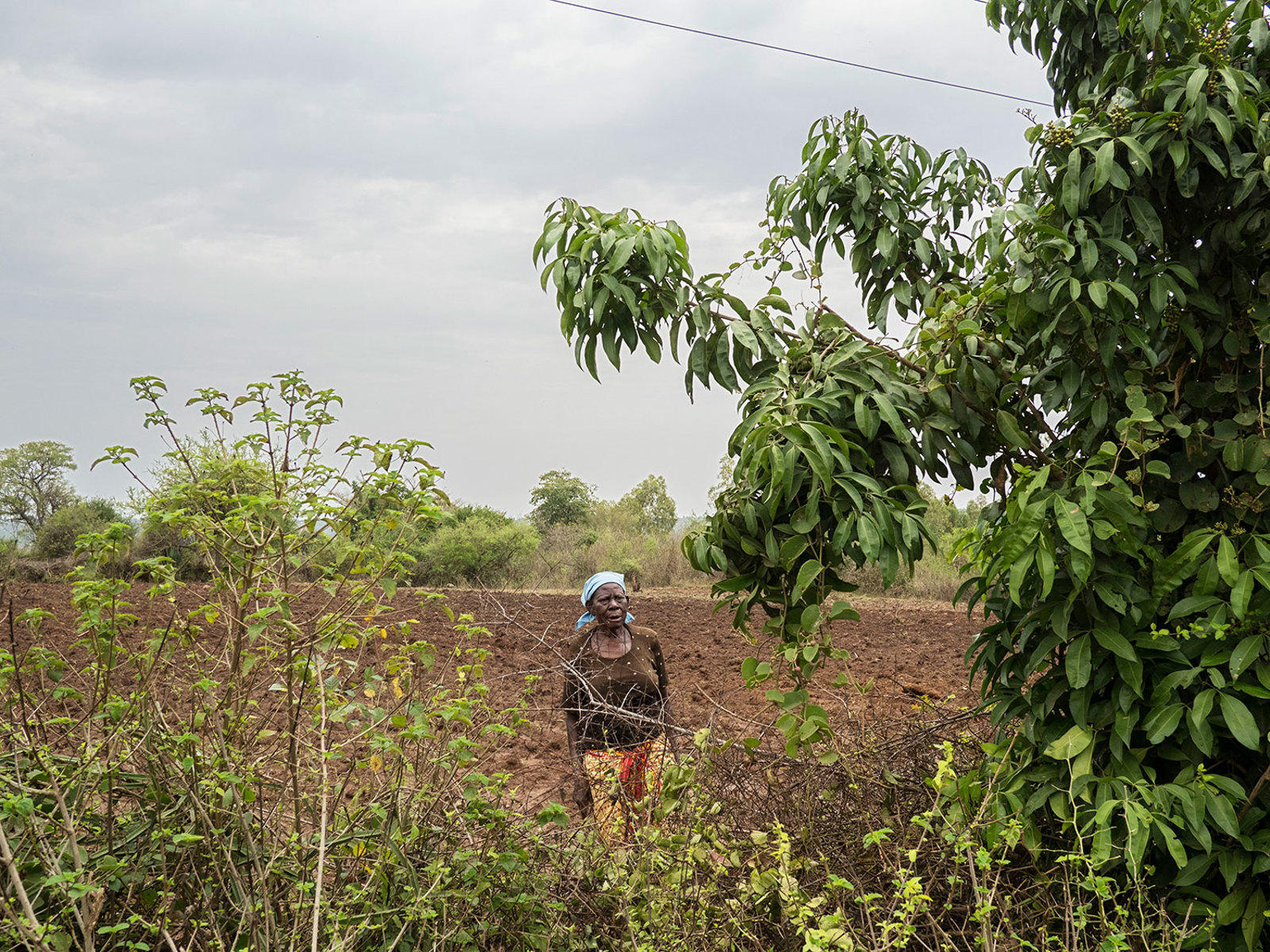
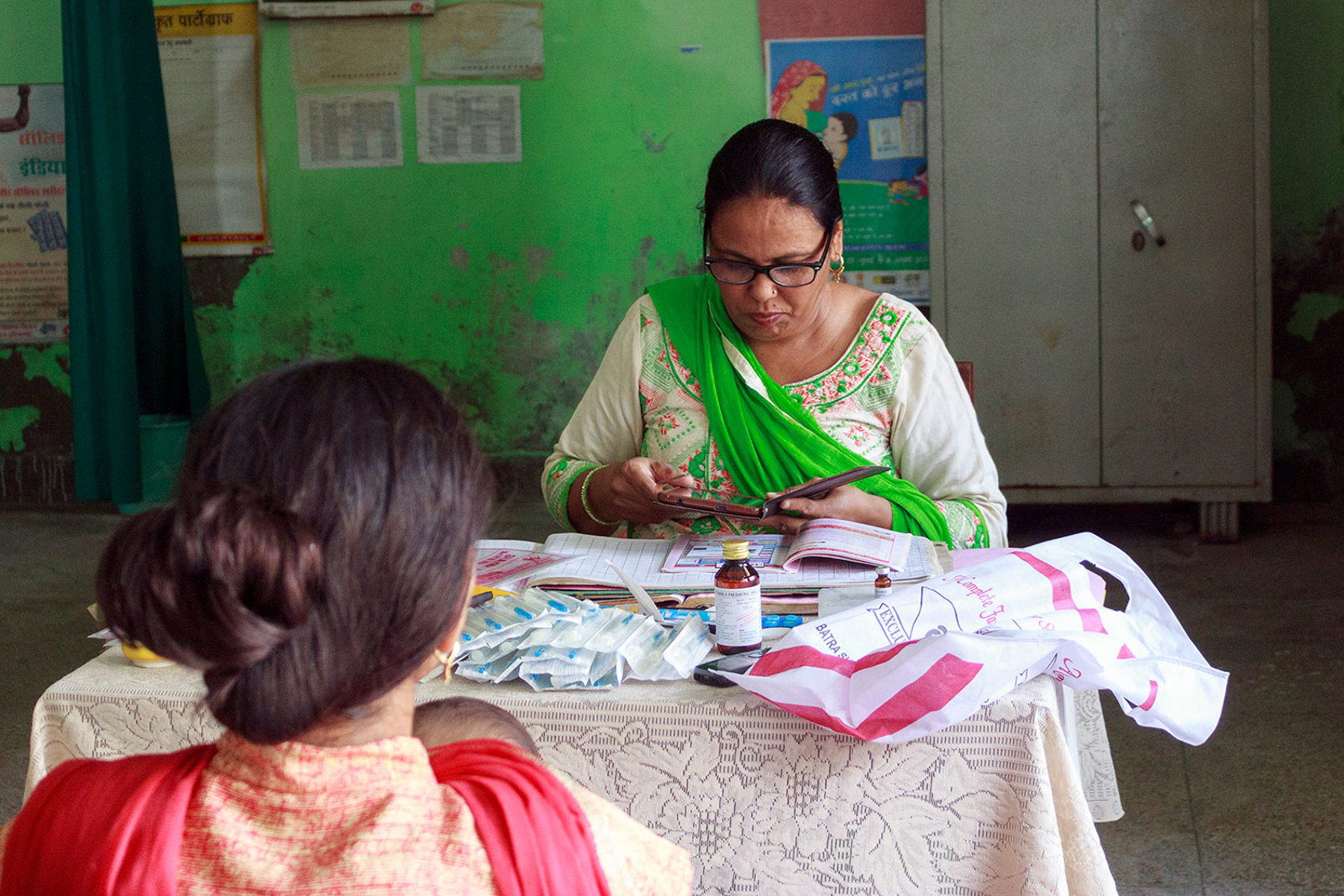
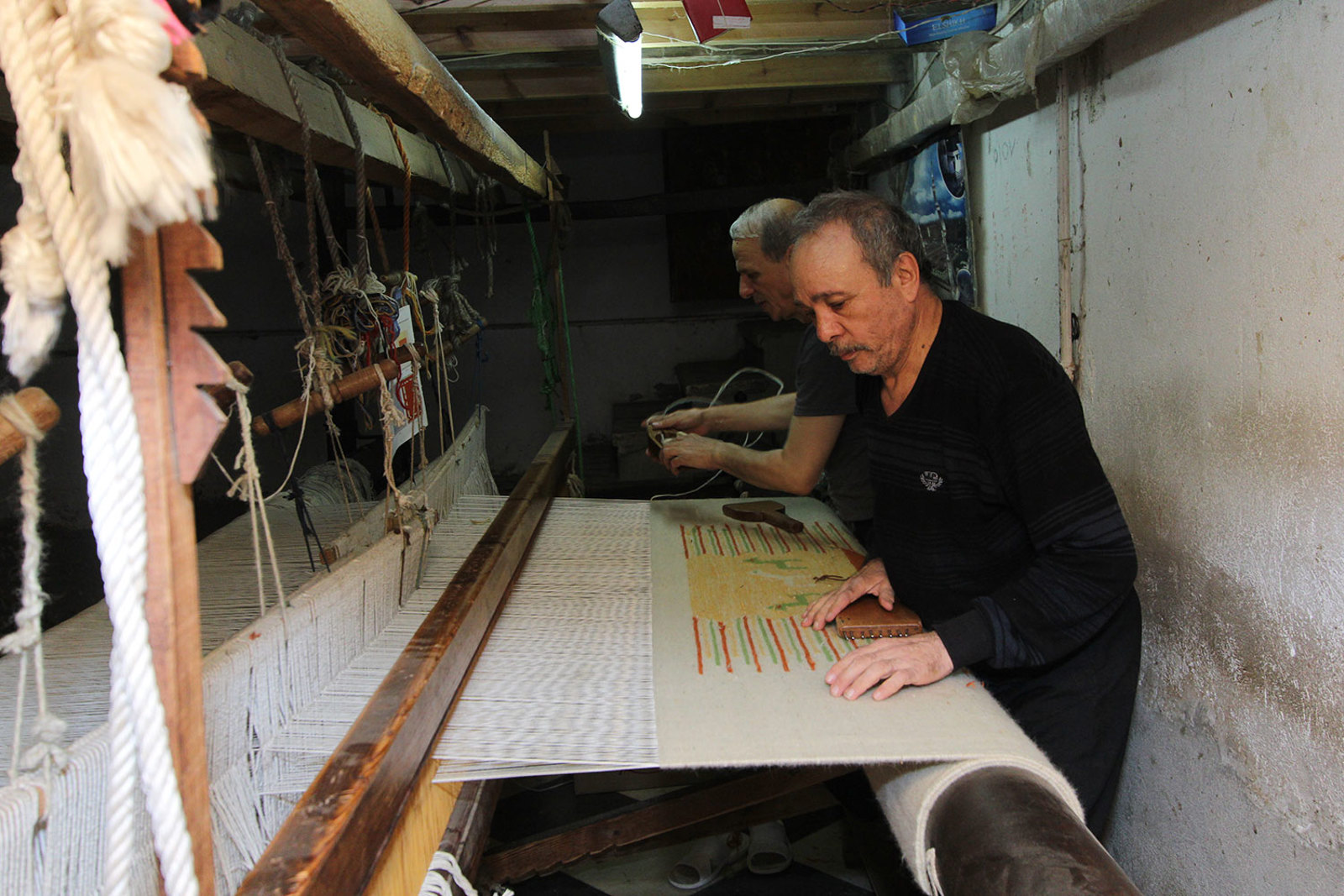
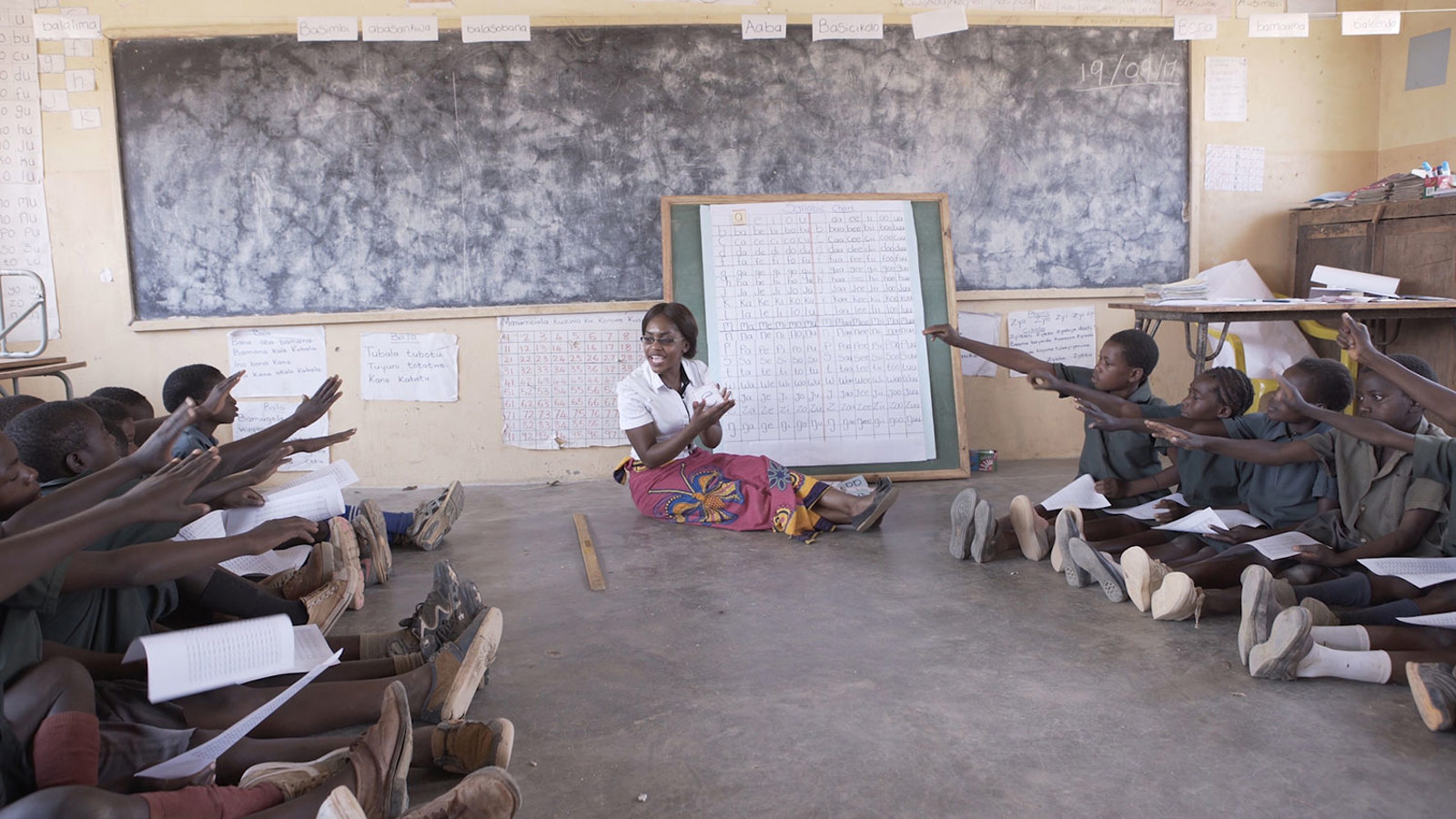
Key learnings for philanthropists
Challenge the status quo
Invest in building evidence as well as educating stakeholders
Mohammed Jameel and the founders of PAL knew that an evidence-based approach to international development would yield better, more effective results. But this would take time and a deep commitment to not only pursuing data-driven methodologies but also changing mindsets, as long-term research was relatively new in the region.
As J-PAL co-founder Esther Duflo says: "Our role is to chip away at the problem long enough and persistently enough so we can identify the levers that can improve the situation."
J-PAL has embraced this approach and scaled the use of randomized evaluations and evidence around the world. It is doing the same in the Arab region, engaging local stakeholders (like the Sawiris Foundation for Social Development) to ensure that evidence-based practice has a firm foothold.
Partner with others
Build regional relationships to propel regional progress
J-PAL has learned that it is hard to make a difference in any region without a strong physical presence. A case in point: J-PAL’s robust partnership with the University of Cape Town was key to its success in sub-Saharan Africa and has led to an increase in the number of randomized controlled trials (RCTs) and other collaborations in sub-Saharan Africa.
This approach has also been critical in the Arab region. Jameel’s reputation and relationships have been an essential starting point for launching J-PAL there, as he helped lay the groundwork for the organization’s relationship with AUC (among other efforts). As J-PAL Global executive director Dhaliwal explains, "Jameel opened up many doors for us, making connections to critical partners."
Build capabilities
Provide long-term, flexible funding to fuel impact and growth
Mohammed Jameel wanted to create an organization that would last, so he structured his funding to provide enough space for J-PAL to expand. An endowment provided guaranteed funding, so J-PAL’s leaders could think beyond the next challenge, attract talent, and focus on conducting work rather than on raising funds.
Flexible funding has provided a stable foundation for growing across regions. J-PAL is currently working to identify such funding partners to support its expansion in the Arab region. A strong financial footing has also helped J-PAL start to attract more donors, including private philanthropies and bilateral organizations, who seek to bring programs that work to improve the lives of millions.
About the philanthropist: Mohammed Jameel
Mohammed Abdul Latif Jameel is the founder of Community Jameel, the philanthropy of the Jameel family. He is also chairman and CEO of Abdul Latif Jameel, a global diversified business active in a range of sectors, including transportation, renewable energy, and financial services.
Community Jameel supports social and economic development, including job creation, arts and culture, health, education, poverty alleviation, and ensuring safe, plentiful water and food for all. In addition to founding J-PAL, Community Jameel established J-WAFS (the Abdul Latif Jameel Water and Food Systems Lab), J-WEL (the Abdul Latif Jameel World Education Lab), and Jameel Clinic (the Abdul Latif Jameel Clinic for Machine Learning in Health), all based at Jameel's alma mater, MIT.
Jameel received the King Abdul Aziz Medal of the First Order, Saudi Arabia’s highest award, from King Abdullah for his job-creation initiatives for young men and women. He also received an Honorary Knighthood from Queen Elizabeth II of the UK for his philanthropic activities and support of arts and culture.
This content was first published in 2020 by Project Inspired, a collection of video interviews and case studies drawn from conversations with some of the Arab region’s leading philanthropists and foundations. Project Inspired is supported by the Abdulla Al Ghurair Foundation for Education and the Bill & Melinda Gates Foundation, and produced by knowledge partners The Bridgespan Group and Philanthropy Age.
